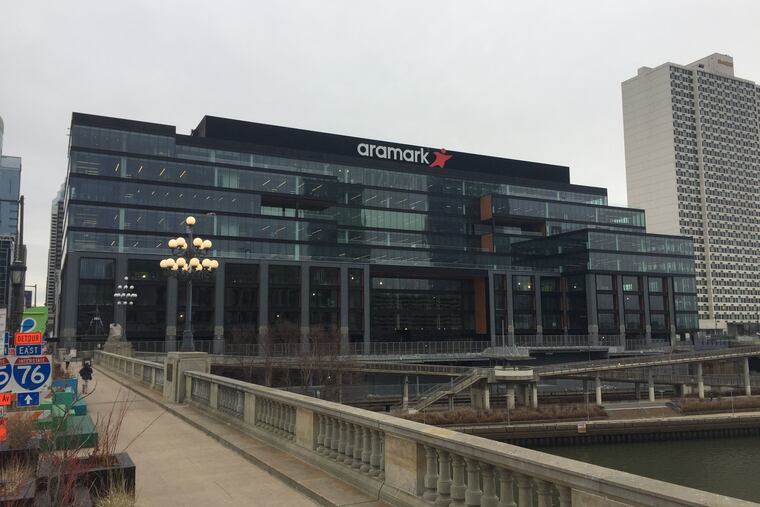Bonuses are paid, Aramark CFO tells Wall St. That’s not what thousands of managers were told
Tuesday's conference call on Aramark's first-quarter earnings brought little clarity to the cancellation of bonuses for lower-level managers.

A top Aramark official sent mixed signals about payment of bonuses to thousands of managers on Tuesday while responding to Wall Street analysts' questions.
Two analysts came up pretty close to empty when they asked Aramark officials about the Philadelphia company’s decision not to pay 2018 bonuses to thousands of managers while spending $90 million of its windfall from 2017′s corporate tax cut on one-time payments and other benefits for employees.
First up with a question about bonuses during the food and facilities giant’s quarterly earnings conference call was Bank of America analyst Gary Bisbee.
“Can you help us frame the investment in the U.S. workforce you discussed against what probably might not have been telling the whole story, but press reports from your local paper about reduced 401(k) contributions and managers not getting bonuses? Adding that all up, what’s going on, or what’s the incentive for doing this?”
Stephen P. Bramlage, Aramark’s chief financial officer, responded that the company was “pleased to have the opportunity to have this kind of a cash windfall from tax reform to reinvest in the domestic business.” As to the bonuses, Bramlage acknowledged the news coverage, but said: “From our perspective, obviously, the company paid bonuses in 2018 that were earned.”
But that’s not what the company communicated via email —-- a copy of which was reviewed by the Inquirer — to thousands of managers. Aramark employs 14,000 people in Pennsylvania, including nearly 6,500 in the Philadelphia region. Bonuses, which are built into employment agreements, can be 20 percent or more of a manager’s compensation, depending on performance.
Andrew Wittmann, an analyst at Baird, took another stab at understanding what happened: “Is it fair to say that there was a higher-than-usual number of managers that didn’t get incentive bonuses for `18?” Wittman also wondered if there was a reversal of accruals in the fourth quarter because bonuses were not paid.
Bramlage then spoke of 2018 as if it had been a normal year, not one in which the company decided not to pay bonuses to a vast swathe of its management ranks — including people who run school cafeterias and general managers of large stadiums — because “it was a year in which we saw great disparity in the financial performance across our US businesses,” as the email sent last Friday said.
“We are actually paying out bonuses a little bit below our target levels because we didn’t make the targets that had been set,” Bramlage said. “There are always going to be in any given year folks who receive bonuses higher than the target amount based on line-of-business performance and there will be folks who receive no bonus based on results as well.”
Aramark, which divides managers into eight tiers or “bands,” with band one being the highest level, did not respond to questions from the Inquirer about why it did not pay bonuses to managers in tiers five to eight who earned them instead of canceling bonuses across the board.
Some Aramark employees who contacted the Inquirer said they were owed bonuses of $30,000 and more. The highest one-time payment tied to the company’s tax windfall is $27,500, employees said. All employees in each tier get the same amount, which means that some could get more than they earned in bonus.
The company also declined to say how much it saved by not paying the bonuses or how much it would spend on the one-time bonuses.
Aramark had adjusted operating income of $1.1 billion in the fiscal year ended Sept. 30, up 15 percent from the previous year. That barely met a target set three years ago for its operating margin in 2018. In its annual report, Aramark highlighted “a reduction in personnel costs, including employee incentive expenses,” as a factor its operating profit increase, but did not specify how much was attributable to the cancellation of bonuses.
The analysts, Bisbee and Wittmann, did not respond to requests for reaction to the answers they got to their questions.
Aramark, which employs 274,400 people globally, booked a $237.8 million benefit from the federal Tax Cuts and Jobs Act of 2017, which slashed the federal tax rate for corporations to 21 percent from 35 percent, the company disclosed in its annual report.
CEO Eric J. Foss received $2.6 million in annual incentive bonus payments for the 2018 financial year. That was 77.3 percent of the target the board of directors had set for him. Foss’ total compensation for the year was $16 million.